#black queer hamlet fat ham
Text
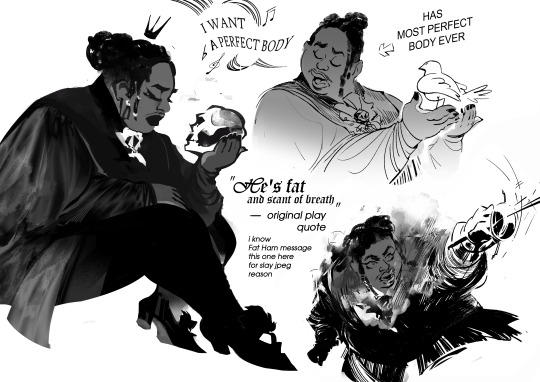
making Hamlet fanart in 2024, slapping Juicy (main hero of Fat Ham, a modern play, Hamlet version, played by black fat queer person) on char design i saw in old b&w film while listening MCR playlist was an experience
highly recommend. also pls watch/read Fat Ham
upd: image description added! (in alt text, but also under the cut)
(Image Description:
List of sketches with 3 drawings. The textures used here are elegant looks-like photo silk (for clothes), soft shades and gradients. Shapes are sinking in each other depth. No color, black and white
It's fanart depicting Hamlet character being combination of different versions of him from different media: fat black queer masculine person being elegant, wearing mascara and lipstick (took from modern play Fat Ham) wearing vintage royal clothes (took from old classic film). The narrative of sketches also mixed of modern play (Fat Ham) and classic one
There are 3 sketches:
First one. It's the character described above (TC in text further) sitting in side view. His eyes is closed and face has melancholic emotion. TC is holding a scull. There is a simple-shaped silhouette of crown above his head. This image represent classic play melancholic vibes of character fused with modern play appearance
Second sketch. It's TC singing, while holding white pigeon in hands. It had previous classic-modern fusion vibes + a little vibe of disney princess song (because of bird and emotion expression similar to disney musicals). By left side of this sketch is stylized speech babble with music notes symbols and deformed text, visualization of singing. The text saying: "I want a perfect body", quoting singing of TC from modern play. By the right side of sketch there is arrow pointing at character with text "has most perfect body ever".
Sketch Three. It's dynamic sketch of TC in a duel (opponent is out of the frame), waving a thin sword (idk how it in eng, in my first it's шпага, a sword but specific type of it). From the chest of TC it's going steam, like character is heated mechanism pushed to limits. The face of TC is strong and determined, with mouth wide open trying to catch breath. Near this sketch is text: (text starts here) "He is fat and scant of breath" - original play quote. i know Fat Ham message. this one [the sketch with duel] here for slay jpeg reason (text ends here).
End of Image description)
591 notes
·
View notes
Text

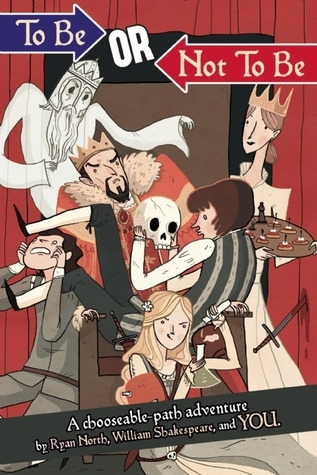
In the play Fat Ham, Juicy, a young queer black man, is confronted by the ghost of his father during a barbecue, who demands that Juicy avenge his murder. Juicy, already familiar with Hamlet's plight, tries to break the cycles of trauma and violence.
literally the best play i've ever seen in my life and yes that includes shakespeare's. won a pulitzer prize. a celebration of black queer love.
Hamlet as told by Hamlet, Ophelia, or the original King Hamlet…but you choose how it goes. You can play it completely straight, or have it involve a deadly game of chess, time travel, a rap battle against a gravedigger, and also tricking Claudius into confessing his deeds with a whole separate choose-your-own-adventure book.
This book is hilarious. You can stay on the rails, and have the author question your choices, planning ability, and weirdly misogynistic worldview, step off them and have fun with how simple it would be to just avert the tragedy. Or just go completely off the rails and befriend a dinosaur, save yourself with a time loop, become a pirate king, conquer Denmark with a ghost army, start a race around the world, kill literally every character in Hamlet, become an inventor, and so on.
#tournament#to be or not to be#fat ham#to be or not to be ryan north#fat ham sounds amazing#but ive also read to be or not to be and like. It does not sound as impressive as fat ham but it's so much fun#im gonna watch it before voting... i wanna watch it anyway
63 notes
·
View notes
Text
so i read the script of fat ham and. ummmmmm. how am i supposed to be normal about this.
MAKING JUICY'S DENIAL OF RETURNING TO EDUCATION A MAJOR PLOTPOINT. I LOVE IT WHEN PRODUCTIONS EMPHASIZE "WITTENBURG" and how hamlet really wanted to go back but couldn't. We see how much Juicy is upset by that as well as all the other stuff
Juicy gets to be fat and black and fem and reclaim what bits of masculinity he wants to. Larry gets to reclaim what bits of masculinity he wants to, lets himself be soft. ohhhhhh myyyy godddddd the depictions of queer masculinity have me sendingggggggggggggggggggg
ay that's the (barbeque) rub
WHY CAN'T I SEE THIS IN PERSON :(
Ophelia and Juicy's friendship
Ophelia yearning for power
All the subtle homophobia and fatphobia weighing on juicy while many act like its not a big deal
aLL THE BARBEQUE PUNS
gertrude was so good.
all the calls to the audience. we're characters too. juicy gets to tell his story, he is not compelled into repeating his father's violences and deprived of his voice. HIS VOICE ONLY GETS SWEETER. HE RETAINS HIS VOICE, HIS LIFe
CHARADES!
21 notes
·
View notes
Text
saw Hamlet last week and the fashion was v clearly evoking a time period w/o being historically accurate, so everyone had colorful patterned fabric with some metallic/shiny thread as part of the design. Except for our boy Ham, who was wearing a black shirt with white poofy sleeves (to better show the blood later on in the show) and the shiniest element of his costume was......this leather short sleeves+collar combo that was, imo, v bondage-y except for the fact that it was over clothes. I can't find a good pic of the actor in costume but this isn't too far off for the leather piece. Overall he looked much more piratey than princely

Then I saw The Tempest today, a free shakespeare in the park version. The royal party were all in modern-day suits, Miranda and Prospero were in kinda resort lounge wear, like loose fabrics that are a bit flowy (Miranda also had plant garlands decorating her outfit, showing she's much more "from the island" than Prospero) and Ariel was in white pants, a sparkley mesh shirt, and a shiney rainbowy leather-style harness with angel wings on it, possibly this exact style

....so like does every Shakespeare play have a leather harness in it? I'm looking at my list of upcoming shows to see what other shakespeare is interesting me. Twelfth Night set in a 1970s German nightclub, Fat Ham is a modern-day Hamlet where Ham is a queer black man, another Twelfth Night but a jazz funk musical adaptation...........yeah I think those could all very easily have leather harnesses in them
I am thinking maybe the adaptations I'm interested in say more about me than about Billy Shakes & the people who put on his shows BUT i saw Hamlet because it was in repertory with R&G Are Dead and The Tempest because it was a free show and heavily referenced in The Librarians so the fact that both of those had leather harnesses is actually about the people who love Shakes enough to put on these shows
altho tbh I am adding "shakespeare play costumed fully in bondage gear" to the list of shows I would put on if I ever get theater producer money. That guy who has his head turned into a mule's head could have a puppy-style mask. Altho the leather with the hot theater lights might give heat stroke to all the actors.......much to think about
6 notes
·
View notes
Text
AITAF’s 2022 Broadway Show

I’ll start by stating what we all know: Without fail, every AITAF show proves to be a profoundly moving experience in one way or another. Whether it’s the reading itself, the talk back afterwards, or simply the atmosphere and sense of connection filling the theater, these nights are always to be remembered. Even speaking as a theater devotee who sees live performances on the regular, AITAF always elevates the experience by emphasizing the collective, community-building nature inherent to the act of performing and watching a play. At heart, AITAF’s mission is to break down barriers: not only barriers between military and civilian viewers in the audience who all find themselves sharing an emotional experience on the same terms; but between military individuals in the audience and the artists on stage as well. To me, this is what makes the AITAF experience truly singular – staying in your seat after the performance concludes, as you watch the invisible boundary between stage and audience dissolve through dialogue and communion.
More than any year prior (at least the four years I’ve attended), this 2022 show highlighted how bold and daring this mission truly is. Putting actors and military personnel in the same room to have a chat and feel some feels together was always something of a radical idea, but this year’s event took the concept so much further. While this was not the first time the Broadway event featured an all-black cast (see my recap of the 2019 performance of A Raisin In The Sun), Fat Ham raised the bar with a veritable celebration of queerness, blackness, and all manner of ‘other’-ness. One of the play’s emotional peaks takes place between Juicy (the Hamlet equivalent) and Larry (the Laertes equivalent, portrayed here as a military recruit home on leave). After several interactions showing Larry to harbor feelings for Juicy, Larry finally makes an utterly beautiful yet tormented confession of love, voicing his profound admiration and envy for all the ways Juicy is “soft” in not letting the world harden him or the dictates of others change him. It’s no exaggeration to say this was one of the single most stirring, gorgeous monologues I can remember hearing in a long time.
The play proceeds to confrontation, then eventual acceptance among the older family members of the younger generation’s difference – difference in not only their sexuality but their evolving expectations and dreams for their futures. Juicy’s uncle (the Claudius equivalent) dies when he chokes on a bite of meat and refuses help from his gay stepson – releasing Juicy from his dilemma of whether or not to revenge his father’s murder and passing judgment on the man’s violent tendencies and homophobic predisposition. In the final scene, the remaining characters briefly contemplate the absurd proposal of killing each other in order to stay true to their tragic source material. Instead, they embrace love and a new tomorrow beyond cycles of violence and revenge. The last thing we see is Larry leading a joyous and utterly fierce dance of liberation, disco music and all.
Fat Ham is the sort of brilliantly irreverent, gloriously life-affirming show you have to see to believe. But just based on what I’ve shared above, you can probably understand why this was such a bold, unexpected choice of work to present to a military audience. Broadly speaking, this is the demographic people might expect to vote red and react with discomfort to such intimate examinations of black, queer, and transgender consciousness. But by the end of the night, it became clear that, actually, there is no audience better suited for such a story.
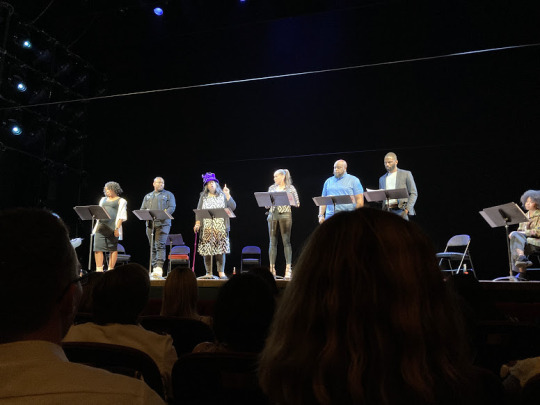
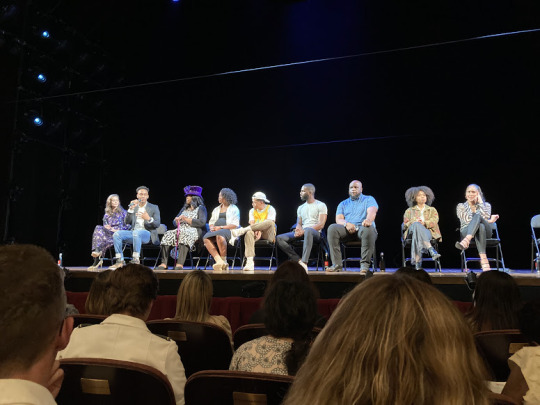
As the talkback began, an immediate connection was apparent between material and audience. A question was posed about the former ‘Don’t Ask, Don’t Tell’ policy, and the audience member expressed how rare it is to see portrayals of LGBTQ people in uniform. The one bordering-awkward moment came when an older woman in the audience asked the cast (and Director, also present on stage) whether they believed this depiction of a multi-generational family to be realistic - wherein the younger generation all identify with an LGBTQ orientation. The actor who’d played Larry (Calvin Leon Smith – who I also saw in the Bridge Award reading in September and who’s truly the real deal; this man will make you feel the whole spectrum of emotion) bridged the moment with grace and sincerity, explaining how he himself grew up as a queer-identifying boy in a southern family, making this show personally resonant and all too realistic. The Director followed up to say that if it seems the LGBTQ community appeared from nowhere or expanded at a precipitous rate, that’s only because we have now, for the first time, reached a period of acceptance when people who were long hidden and silent can finally be themselves and live liberated, honest lives. The answering applause was immediate and enthusiastic, followed by the voice of an audience member from the balcony shouting, “And everyone go vote tomorrow!”
(Cue critical self-examination of my previous assumption regarding service members/veterans’ political ideologies.)
From here, the questions became more personal, delving into the actors’ emotional journeys to portray characters experiencing turmoil, conflict, and loss. An audience member who was himself active in the arts asked MVP Calvin Leon Smith/Larry about his approach to channeling the emotion required of the love confession scene described earlier. Mr. Smith started his response with a shoutout to his acting teacher, who was in the audience. “Sorry, I just love him,” he said, becoming visibly emotional. He again referenced his upbringing and said that the tools he learned through acting for understanding and confronting the layers of his own emotions and identity had made a vast difference in his life, but how some elements of his on-stage performance remain unpredictable. “It doesn’t always happen,” he said, in reference to the tears he’d shed on-stage during the scene. I have to note here that this guy in particular really went the extra mile in terms of his honesty and willingness to become vulnerable with the audience. It was clear that this evening’s rendition of the scene in question had been particularly intense for him, but he leaned further into the self-exposure and was willing to openly examine and discuss the experience. His participation in the talkback truly epitomized the profound strength and utility in confronting and sharing moments of emotional rupture, even if difficult or unglamorous. I felt everything he said extraordinarily deeply.
OKAY I haven’t talked at all about our main man yet, but he features heavily in the last and most emotional question of the night! I already recapped this moment on twitter, but it really deserves more extensive description. The last guy to ask a question (it was more of a comment, really, but every heart in the theater was with this guy) was also a member of AITAF’s marathon team. Here’s the most complete recap I can recall what he said:
While deployed with his EOD unit some years ago, he suffered the loss of his best friend. In attempt to come to terms with his grief, he tried traditional therapy for years but it just wasn’t helping. Then he saw Adam’s TedTalk and it “changed his life.” (He paused here as he started becoming audibly emotional and apologized, then soldiered on.) He started becoming involved in acting, and the tools he learned and techniques he was exposed to finally helped him begin to understand and cope with his trauma. (“I finally felt like I wasn’t just angry all the time.”) He said how rewarding acting has been for him, and that he recently landed his first TV role and will be filming in LA soon. (Cue audience and cast on stage cheering and applauding.)
Spoken directly to Adam: “I really just wanted to say thank you and that what you’re doing really does make a difference.”
(Not lying, I just started crying a little just remembering this moment and typing this all out. The sincerity in everything he said was so palpable, the theater was entirely silent in solidarity, and I saw at least two of the actors on stage shed a tear as he spoke.)
Sitting there and listening to him, I remember being so struck by the raw emotion in his voice that in a weird way (and this is something I never thought I’d say), I couldn’t bear to look over at Adam right away? Almost like the moment was too intense or personal? But once the guy looked over and started speaking directly to Adam, of course I looked too. (God, I’m getting emotional again thinking about this!) Adam was leaning entirely forward in his seat, his attention undivided as if this guy were speaking to him face-to-face from two feet away. There were several pauses in his speech when the audience clapped in support, and I remember Adam holding his hands all the way out before him and clapping in sort of self-effacing recognition. It was clear it wasn’t like he was applauding the content of what was being said (about himself), but rather that he was recognizing and offering respect for this guy’s bravery to stand up and share something so personal, and for his successful journey of healing.
As soon as the question was over and the moment past, Adam leaned over to say something to a nearby security person. It was very clearly something along the lines of “I want to meet that man afterwards” and sure enough, homeboy got his meeting and picture later that night! Now THAT is a tearful happy ending right there if I’ve ever heard one. <3
Okay so with all that substance out of the way, let’s indulge in some classic fangirling, shall we? : ) Knowing that Adam wouldn’t be participating in the reading himself, I expected him to just make brief comments at the beginning of the show about AITAF’s mission, thanking the staff/volunteers, and all the usual. I was pleasantly surprised when he also read a short monologue himself – an excerpt from Take Me Out by Richard Greenberg. (You can hear him do the same monologue in the final minutes of the Vice AITAF documentary.) He tied the reading into the purpose of the evening’s event – an exercise in pausing to celebrate and honor ourselves, especially all the service men and women in the audience. Once he concluded, he left the stage and the cast came on to start the Fat Ham reading.
An unexpected highlight to the whole evening was having a clear line of sight to where Adam and Joanne were watching the play from a box off to the side of the audience. I loved having the chance to see Adam’s reactions to everything happening on stage, and I took almost equal enjoyment from both. It will surprise no one to hear that he’s an extremely attentive viewer. He watched most of the more serious, somber scenes with his head sort of cocked to the side in concentration, arms crossed in his lap. His mirth and delight from the play’s many uproarious moments was on clear display – it was like I could almost hear that weird, honky laugh of his. <3 I can clearly remember moments when I’d look over and just see him full on grinning, clearly enjoying and letting himself get lost in the performance. I mentioned on twitter how much he got into the Radiohead Creep scene, and he really did. It WAS quite a moment. Juicy starts singing the song with only partial commitment, but when the first chorus kicks in the whole cast suddenly lurch into the song in unison, moving to the rhythm as Juicy starts belting out the words. Adam was clapping with both arms over his head, and I wouldn’t be surprised if he let out a whoop in compliment.
When the play started getting more tense in its second half, I noticed Adam sort of resting his hand against his mouth. I couldn’t tell if he was actually biting his nails, but he definitely had his fingers against his lips in a sort of absent-minded way, while his attention was fixed elsewhere. He was clearly engrossed, and I loved this brief opportunity to watch him as a captivated viewer – a rare role reversal considering I’m usually the one watching him with that sort of reverence. And yes, it really made the funny moments all the more memorable and touching whenever I would look over and see Adam laughing right along with me, or just grinning the most boyish, adorable grin in the entire universe. (!!!)
As charmingly earnest as he was in his introductory speech (and just a tiny bit awkward with his initial ‘Hello!... Goodbye!’ to the audience when he stepped forward to see us past the stage lights), and as much as I loved getting to watch him as an audience member – reacting and feeling the same emotions as the rest of us, my biggest takeaway from the night is likely still that final exchange between Adam and the marathon team member. Adam didn’t have a microphone or the chance to respond right away, but he didn’t need to. This was an expression of profound and heartfelt gratitude in response to a conversation Adam had already started years and years before, and which Adam still devotes so much time, care, and energy to sustain. I left the event with a reminder of just how unique, how mighty and transformative Adam’s enduring commitment to realize, grow, and maintain AITAF truly is. A reminder that he has dedicated his passionate, theatre-loving heart to sharing the empowerment and resilience he himself discovered through the arts. And, finally, I left knowing that he has changed lives for the better – some in even more profound, consequential ways than how he has already touched mine.
In closing: Thank you Adam and AITAF for yet another supremely moving, unforgettable night.
84 notes
·
View notes
Text
Playwright James Ijames on 'Fat Ham,' the spotlight on Black queerness and life after a Pulitzer
A Q&A with the Pulitzer Prize–winning playwright of 'Fat Ham.'
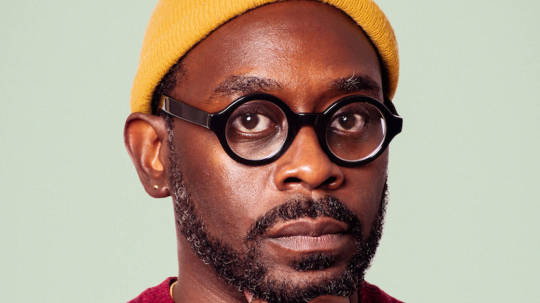
Written by Marcus Scott
Wednesday February 8 2023
James Ijames won the 2022 Pulitzer Prize for Drama for Fat Ham, an irreverent riff on William Shakespeare’s Hamlet that feels like a call to arms for Black joy and queer representation. A jambalaya of satire, magical realism and the American domestic sitcom, the play follows Juicy (Marcel Spears), a morose online-college student, as he tries to come to terms with the marriage of his newly-widowed mother, Tedra (Nikki Crawford), to his Machiavellian uncle Rev (Billy Eugene Jones). “This ain’t Shakespeare,” Ijames noted in the show’s program. “Don’t get me wrong. I love Shakespeare, this just ain’t him. This ain’t a tragedy…This play is offering tenderness next to softness as a practice of living. This play is celebrating Blackness that is traditional and weird and lonely and happy and grieving and honest and frightened and brave and sexy and churchified and liberated and poetic.”
Fat Ham had its world premiere in the spring of 2021 in a digital production by Philadelphia’s Wilma Theater. A year later, it made its onstage debut at the Public Theater, directed by Saheem Ali, and became one of the buzziest plays of the season. On March 21, 2023, that production will begin a limited run at Broadway’s American Airlines Theatre. We chatted over FaceTime with the playwright as he prepared to step into rehearsals.
Fat Ham moves Hamlet from a medieval Danish castle to a modern-day cookout in North Carolina. Why a barbecue?
“Barbecues are cumulative spaces. It starts with a few people and then it grows. There’s food, and people are drinking. It’s a space of truth-telling, it’s a space of game-playing, it’s a space of intimacy and warmth—and it’s where secrets come out. My family recently came together for the Christmas holiday and a cousin of mine made an announcement about being pregnant. Everyone was just so excited and lifted by that; everyone’s energy turned towards them in this really beautiful way. I wanted a space where that sort of collective joy was possible and also where a big, messy argument was possible. Where a fight was possible, where drinking was possible, where eating was possible, where romance was possible. In Shakespearean comedies, when you go outside or into the woods—like the forest of Arden [in As You Like It] or the forest in Midsummer—it’s a space where anything’s possible. There’s magic. We’re not inside, in a cold room in a cold castle. We’re outside: We have decorations, we’re colorfully dressed. We are in the sort of space where magic is palpable and possible.”
Juicy is not your typical Hamlet. He is Black and Southern and, as you describe him in the play, “thicc.” What was the motivation behind that?
“Well, I’m Black and from the South, and that drove my desire to play with people that sound and look like me. When you see productions of Hamlet, he's usually white and sort of athletic. I wanted to make a version of this play that was open to a body type that wasn't that; I'm a person who, for pretty much my whole life, has had some struggle with my weight and my perception of what I look like and how I feel in my body. And another thing I wanted to do was to explore Blackness in the South in a way that felt contemporary, that didn't feel held by history—looking at Southern communities right now as opposed to a nostalgic imagination of the Black South.”
Why did you choose for Juicy to have a passion to study Human Resources in college?
“Human Resources is about care and workflow. Efficiency. I wanted Juicy to have a passion for something that felt antithetical to his father. He wants to make sure people are okay.”
How does that contrast reflect other things about the way you have approached Shakespeare’s story?
“I think the play is exploring multiple modalities of masculinity. We see a lot of different kinds of Black masculinity on the stage. We see Juicy, we see Tio, we see Larry, we see Pap and Rev. And there’s a masculinity that’s implied about the community that they live in, that is sort of present in the room. I wanted to show that masculinity is not monolithic—it’s not as simple or cut-and-dried as it’s often depicted. I also wanted to explore cycles of trauma and violence in families. I’m interested in primordial stories, stories that no matter what culture you walk into, there’s like a version of them. I always think of Hamlet as—and I don't know that a lot of people think of it this way—but I think of Hamlet as a Cain and Abel story: the story of a sibling killing their sibling to get ahead. Anybody can relate to that; that’s a [narrative] that you inherit and moves with you through generations. And the younger folks in the play have to make some decisions about whether or not they want to continue that, whether that’s what they want their lives to look like and their relationships to each other to look like. I’m calling into question the stories that we’ve been passed down as wisdom. Because sometimes it’s wisdom, but more and more I look at those stories as cautionary tales of what you shouldn’t do. Vengeance isn’t gonna help Juicy. Killing his uncle is not gonna help Juicy’s life get any better.”
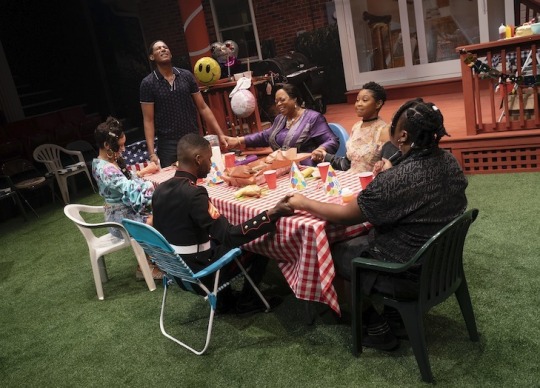
Your breakthrough play was Kill Move Paradise in 2017. How do you think you've changed as a writer since then?
“Oh, gosh. When I look at Kill Move Paradise, that play is quite erratic, you know [he laughs]. I always describe it as the way that I try to metabolize my anger and my fear and anxiety about being a Black body driving around in America, walking around in America, just trying to live my life. And so it has that anxiety in it. It has that fear and nervousness in it. It’s in the text, you can feel it on the page. As I've gotten a little older, I've experienced more and I've written more—the more you write, the better writer you become. I'm more intentional with story, with plot; how I'm weaving a theme or a theory into the action of a play is a bit more sophisticated than it was when I was starting out. The anger is usually shrouded in rebellion or exuberance. At a point in my life, anger sort of dragged me down into a space of high-blood-pressure fury. But I think now the work offers people an invitation to metabolize anger in a different way. By the time we get to the end of Fat Ham, people are dancing in the aisle.”
They certainly are.
“And that is not to negate the fact that we’ve just watched the thing that had pain in it, that had trauma in it, that had violence in it. But just because you’ve been through difficulty doesn’t consign you for the rest of your life to difficulty, to trauma, to pain. We have access to joy, we have access to resilience, we have access to exuberant ecstasy. Black history, in this country in particular, teaches us that: The blues and jazz and hip-hop come out of extraordinary awful scenarios and settings. Those art forms are undeniably both Black, but undeniably exuberant, resilient, unabashed, queer—all of those things! They possess all of those things. When I sit down to write a play, I know that at the end I have to send people out into the world, into the streets, into workplaces, into homes. My hope is that I’m leading them to some hope.”
This play is pretty fantastical, and there are various displays of spectacle and magic. There are also a panoply of images and homages to the Pan-African cultural experience—allusions to Louisiana Voodoo as well as Central African, Creole and Haitian Hoodoo symbology.
“Ghosts are a feature in a lot of my plays. Magic is a feature in a lot of my plays. Because I’m a person who grew up with people who kind of had magical ways of thinking. I grew up Baptist: hardcore, every Sunday, sang in the choir, youth ministry, youth usher—like, I am a church gay! I also grew up in a family that has New Year’s Eve traditions that they do, and will throw salt over their shoulder, or say “Don’t sweep over a single man’s shoe because he won’t get married.” That sort of Hoodoo connection to the spirit world and connection to ancestors was also a big part of the family that I grew up in. And so magic in that respect feels very real to me. Ancestors feel very present—the reverence for people who have passed on is immense. So, to me, the ghost of Juicy’s father showing up isn’t just a specter from this other world that is coming with caution and with information. Juicy is having a conversation with his ancestor and he talks to his ancestor, the way that I talk to mine. The thinness of that veil between here and there—I relish in that, and the theatrical allows you to do that with a lot of ease. I didn’t want the ghost to be a joke. He’s funny—that cat is extremely funny—but he also has these great moments of, like, “Wow, I really messed you up.”
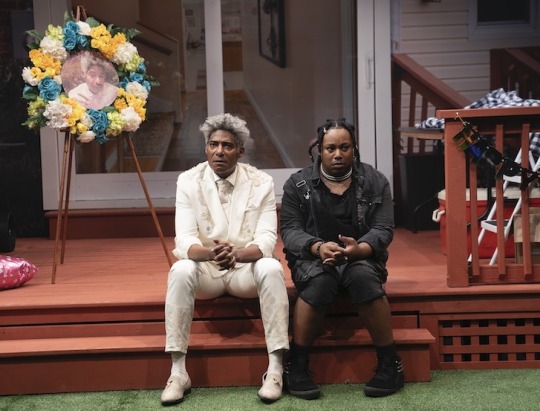
There is a long literary tradition of Black writers explaining Blackness to people who aren’t Black. You don’t do that here. In fact, this play comments on performing Blackness, trauma porn and “enterpainment” on stage—and it’s done with humor. Why was this important to you?
“Humor is powerful. It opens us up to hearing things in a new way. It’s a big part of all of my plays. The question about explaining Blackness is huge to me. I don’t feel like I have to explain Blackness to an audience. I’m assuming that everyone will catch up who doesn’t understand.”
At the end of the show, there’s a cover of the funky dance-pop disco tune “Kill The Lights” sung by Broadway actor Mykal Kilgore. What inspired that particular needle drop?
“I love disco music, just personally. Anybody can dance to it. If you are off-rhythm, you will be on a rhythm with disco music because it’s four-on-the-floor and is just all-encompassing. It strives for ecstasy, it strives for moving from a passage from one state to another. Probably because they were all like using drugs and having sex while they were listening to it in the Seventies and Eighties. But this is a contemporary artist singing in the disco style. It’s not a song from the era. It just moves people! That music moves people.”
If you were to classify your previous plays by genre, with Fat Ham being disco, what would your other shows be?
“Ooh.” [He laughs.] “I think Kill Move Paradise, if I had to put a genre to it, it’s Southern hip-hop, right? It’s sort of grounded in that culture. I would say White is like pop music—it’s like my Ariana Grande album. And Miz Martha is Americana music. It’s like bluegrass with a trap beat.”
Only nine writers of Black descent have been awarded the Pulitzer Prize for Drama in its 105-year history: Charles Gordone for No Place to Be Somebody, Charles Fuller for A Soldier’s Play, August Wilson for Fences and The Piano Lesson, Suzan-Lori Parks for Topdog/Underdog, Lynn Nottage for Ruined and Sweat, and the last four prizes in a row—Jackie Sibblies Drury for Fairview in 2019, Michael R. Jackson for A Strange Loop in 2020, Katori Hall for The Hot Wing King in 2021 and now you. Is something going on in the zeitgeist? Is there something special about Black writers that make their work more urgent right now?
“I think a few things are happening. Black writers and Black directors have been trying to push the form in new directions, to be both in conversation with the cannon and also pushing against the cannon. Those four plays—starting with Fairview and going to A Strange Loop, The Hot Wing King and Fat Ham—all four of those plays are actively doing those things. And so are some plays that haven’t won Pulitzers but have been defining culturally, like Slave Play and things like KPOP. The audience for that work is already there and primed, and it’s just waiting for someone to make art for them, you know what I'm saying? People are curious about what is possible in the form. I remember seeing Fairview and just being blown away by the audacity of it. It made me want to be more ambitious—to create more of a social experiment with my work in collaboration with an audience. I think the same thing is true of A Strange Loop and Hot Wing King in terms of those plays’ exploration of Black queer identity. And that flows rather beautifully into Fat Ham, which is doing the same sort of thing by taking a play that people cherish like Hamlet and saying, ’Not only is this mine, it’s mine in these particular ways, and this is what I’m gonna keep and this is what I’m gonna discard.’ So some of it is just us, as writers, wanting the form to feel as vital and as urgent as possible. And one way to do that is to examine how we write things and try to find new ways into storytelling.”
Those last three plays in particular have centered on Black queerness, and on what we might call radical softness. Is there something in the ether? Was there something in the culture that made us say, “Now that’s something we need to address, to attack, to appraise?” Because it all kind of happened around the same time.
“Hmm. I don’t know. That stretch of plays spanned the heartiest points of the pandemic, and we were all quite hungry for connection, closeness, touch, tenderness. And that offered an opportunity for people to be excited about seeing something that felt soft or vulnerable. I think people respond to that because we want to be better. Culturally, I think, we want to try to do things differently. It remains to be seen whether or not that will continue, but people wanted to engage with things that felt tender, that felt connective, and all of those plays are great examples of that. And I think that’s also true of Fairview; with the separation that it is asking for, it’s asking for people to sit in an embodied space with an idea.”
Last question: How has your life changed post-Pulitzer? Has that changed how people think of you and your work? Or how you think of yourself and your work?
“Oh my gosh! It’s just made my life so much busier, but it’s also made me focus on the work. Refocus on my craft and my practice. I don’t want this prize to freeze me in time. I want to keep pushing and keep expanding what I do.”
Fat Ham begins previews at the American Airlines Theatre on March 21, 2023, and opens on April 12. Tickets are available here. This interview has been condensed and edited for clarity.
Follow Marcus Scott on Instagram:@therealmarcusscott
Marcus Scott

#Marcus Scott#MarcusScott#WriteMarcus#Write Marcus#playwriting#playwrights#playwright#James Ijames#JamesIjames#Fat Ham#FatHam#Broadway#The Public Theater#Public Theater#Time Out#TIme Out New York#TimeOutNewYork#TimeOutNY#Time Out NY
6 notes
·
View notes
Text
0 notes
Text
James Ijames, Philadelphia's Pulitzer Prize-winning playwright, brings 'Fat Ham' play to Broadway
The play is called Fat Ham and it's the story of Hamlet only set in the American South with a Black family, a queer-focused narrative and a main character named Juicy.
0 notes
Text
Theatre Review: Fat Ham (Public Theater, New York) ★★★★★
Theatre Review: Fat Ham (Public Theater, New York) ★★★★★
While Michael R. Jackson’s 2020 Pulitzer Prize-winning musical A Strange Loop is enjoying a hit run on Broadway—and is deservedly the most Tony-nominated production of the season—downtown at the Public Theater a 2022 Pulitzer-winner, James Ijames’ Fat Ham officially opened last night, with its original run already extended twice until July 3rd. Both are extraordinarily impactful and hugely…
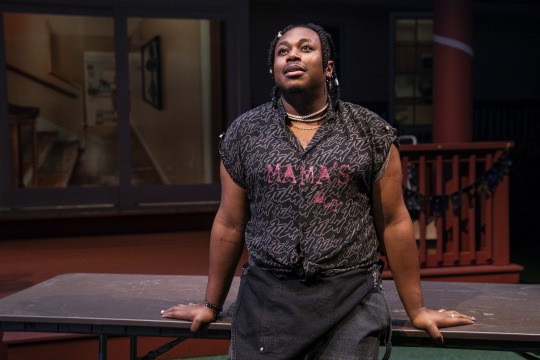
View On WordPress
#black queer hamlet#black queer hamlet fat ham#black queer tehater review#black queer theater#black queer theatre#fat ham black queer hamlet#fat ham play#Fat Ham Public Theater#fat ham pulitzer prize review#fat ham review#Gay theater#gay theatre#James Ijames fat Ham#James Ijames fat Ham review#James Kleinmann#lgbtq theater#lgbtq theatre#LGBTQtheatre#new play review#New York theater#New York theatre#new york theatre review#Public theater fat ham#pulitizer prize winning play#Pulitzer Prize fat ham#Pulitzer Prize winner#queer theater#queer theatre#queer theatre review#theater
8 notes
·
View notes
Video
youtube
Critically-acclaimed playwright James Ijames reinvents Shakespeare’s masterpiece with his new drama, FAT HAM. Juicy is a queer, Southern college kid, already grappling with some serious questions of identity, when the ghost of his father shows up in their backyard, demanding that Juicy avenge his murder. It feels like a familiar story to Juicy, well-versed in Hamlet’s woes. What’s different is Juicy himself, a sensitive and self-aware young Black man trying to break the cycles of trauma and violence in service of his own liberation. From an uproarious family barbecue emerges a compelling examination of love and loss, pain and joy. FAT HAM is a delectable comic tragedy directed by The Public’s Associate Artistic Director Saheem Ali.
#shakespeare#william shakespeare#shakespeare and adaptation#fat ham#hamlet#pulitzer prize#Saheem Ali#James Ijames#public theater
48 notes
·
View notes
Text

Fat Liberation month is a great reason to remember that
Hamlet is originally fat character!
Did you know that in original play there is a quote which tells literally by word "fat" that hamlet is fat?
In original text, in moment of duel of Hamlet and another character, Hamlet's mother says: "He's fat, and scant of breath".
In * original * . In modern version of play it is removed and replaced by word "sweat" (despite original play have word "sweat", so if it would be needed to use word "sweat" - that word existed back then and was used in original play too, so "fat" is original word choice. honestly, i was so mad then i dived into research and was faced with "but what aaactually the word "fat" could mean back then" articles, ooooh-)
Sources:
Original Play
Here you can find modern version of play
Also, there is play "Fat Ham" which is contemporary innovative interpretation of Hamlet, it also has stage version.
"Fat Ham" is something like..."modern au" where Hamlet narrative go with new optics, and events takes place at black family barbeque. And Hamlet version there is Fat Queer Black guy (the image in post based on actor's appearance + slapped by me with original play vintage costume vibes)
Unfortunately i don't know where to read or watch "Fat Ham" but i watched 5 seconds of promo and i am so happy that this thing exist
Also here is the post where my followers gave me this sacred knowledge about hamlet (and Shakespeare himself) being fat and opened Fat Ham to me which is very thank you!
184 notes
·
View notes
Text


In the play Fat Ham, Juicy, a young queer black man, is confronted by the ghost of his father during a barbecue, who demands that Juicy avenge his murder. Juicy, already familiar with Hamlet's plight, tries to break the cycles of trauma and violence.
literally the best play i've ever seen in my life and yes that includes shakespeare's. won a pulitzer prize. a celebration of black queer love.
Set in India in 1995 during the (at the time) peak of the Kashmir insurgency, university student Haider returns home to learn that his father has disappeared, arrested for aiding terrorists. With no knowledge of where his father is now, Haider desperately searches for answers, until a strange man tells him that his father has been executed; due to Haider's uncle Khurram's betrayal.
Visceral. Good. Unfortunately still very relevant to current events (besides other violence going on, Kashmir has also worsened recently) but so it's a good way to bring eyes to this conflict. Hamlet is Muslim. STELLAR reimagining of characters and plot points from the original. Great acting. The supporting characters are clearly all considered individually and really thought out. Tabu kills it as Gertrude (Ghazala). Hamlet kills Ros and Guil (Salman & Salman) with a rock. Ophelia and Horatio are one character. The play within a play is a song. It's really great.
watch the play within a play song ('bismil')
#Breaking of the generational trauma cycles vs. All the generational trauma cycles#interesting matchup#fat ham#haider#tournament
23 notes
·
View notes
Photo
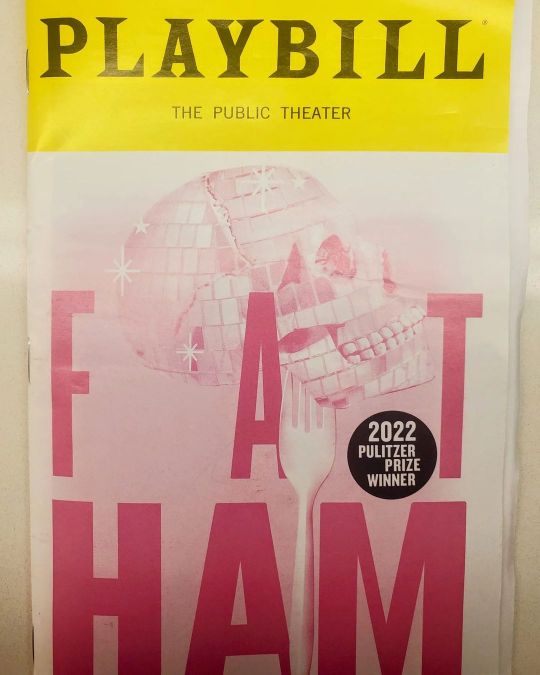
🎭#ArtIsAWeapon WILD ASS RAUCUS RIDE! Catch #FatHam at the @publictheaterny before it closes July 31. https://publictheater.org/productions/season/2122/fat-ham/ "FAT HAM Co-Production with National Black Theatre [ @nationalblacktheater ] By James Ijames Directed by Saheem Ali Critically-acclaimed playwright James Ijames reinvents Shakespeare’s masterpiece with his new drama, FAT HAM. Juicy is a queer, Southern college kid, already grappling with some serious questions of identity, when the ghost of his father shows up in their backyard, demanding that Juicy avenge his murder. It feels like a familiar story to Juicy, well-versed in Hamlet’s woes. What’s different is Juicy himself, a sensitive and self-aware young Black man trying to break the cycles of trauma and violence in service of his own liberation. From an uproarious family barbecue emerges a compelling examination of love and loss, pain and joy. FAT HAM is a delectable comic tragedy directed by The Public’s Associate Artistic Director Saheem Ali." #BlackGirlTheaterGeeks #BlackPlaywrights (at The Public Theater) https://www.instagram.com/p/Cf72wBHMUvz/?igshid=NGJjMDIxMWI=
0 notes
Text
ok i had the luck to be able to see a double-feature of Hamlet and Rosencrantz & Guildenstern Are Dead with the same cast (Ham was also modified to be more cohesive with R&G) and Fat Ham is playing near me in a few months, which I had put down on my list as "interested in seeing it, if I really like Hamlet" and lo i DID really like Hamlet and now Fat Ham is officially on my list of to-see shows
so Fat Ham is a modern-day black+queer adaptation of Hamlet and i just found out that there's also a modern-day(-ish, it's probably set in the '90s) black adaptation of R&G Are Dead, Pac & Biggie Are Dead, which is an incredible concept so once again I am asking: please god give me theater producer money to get these shows put on in repertory
1 note
·
View note
Text
‘Fat Ham’ Review: A Queer, Black ‘Hamlet’? Ay, There’s the Spice Rub.
‘Fat Ham’ Review: A Queer, Black ‘Hamlet’? Ay, There’s the Spice Rub.
Perhaps the real tragedy of “Hamlet” is that it doesn’t end with a dance party; too many of its characters lie dead at the final curtain for anyone to shake a leg.
But if “Hamlet” wallows, “Fat Ham,” the hilarious yet profound new “Hamlet”-inspired play by James Ijames, prefers to mellow. Built on the gnawed bones of its predecessor, and reset in the modern-day South among members of a Black…

View On WordPress
0 notes